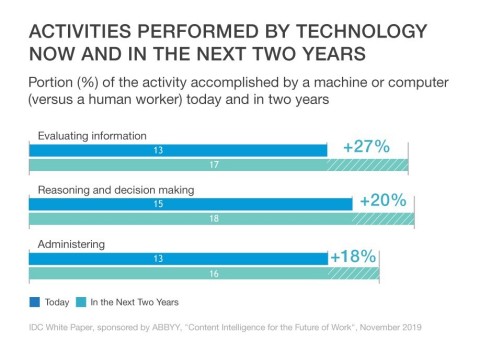MILPITAS, Calif.--(BUSINESS WIRE)--New survey from leading research firm IDC has revealed the true extent of software robots supporting humans in the workplace. The IDC White Paper, Content Intelligence for the Future of Work, sponsored by ABBYY, indicates that the contribution of software robots, or digital workers, to the global workforce will increase by over 50% in the next two years. These results, from a survey of 500 senior decision-makers in large enterprises in the U.S., Canada, the U.K., Germany, France, and Australia, illustrate a fundamental shift to a future of work dependent on human-machine collaboration.
“A growing number of employees will find themselves working side-by-side with a digital coworker in the future as technology automates many work activities,” commented Holly Muscolino, Research Vice President of Content and Process Strategies and the Future of Work at IDC. “Think human and machine. The human-machine collaboration is not just the future of work, but it is the new normal for today's high-performing enterprises.”
It is not just mundane, repetitive jobs like data input that new digital colleagues will help human workers complete in the years ahead. The growth of machine learning (ML) through human-centric artificial intelligence (AI) means robot assistants will also help employees make better decisions. In most cases, these technologies enhance rather than replace human capabilities. For example, the survey found that technology evaluating information will grow by 28% in two years, and 18% of activities related to reasoning and decision making will be performed by machines.
IDC forecasts that the intelligent process automation (IPA) software market, which includes content intelligence and robotic process automation (RPA), will grow from $13.1 billion in 2019 to $20.7 billion in 2023. Since many of the repetitive processes and tasks that are well suited for automation by RPA are document and content centric, content intelligence technologies frequently go hand-in-hand with RPA in intelligent process automation use cases. Automation initiatives will also be enabled by process intelligence, a new generation of process mining tools providing complete visibility into business processes – the critical foresight needed to improve the success of an IPA project.
Over 40% of survey respondents have experienced a notable increase in customer satisfaction and employee productivity by deploying content intelligence technologies into their digital transformation strategy. Additionally, more than 1/3 of respondents saw an improvement in responsiveness to customers, new product or revenue opportunities, increased visibility and/or accountability, or increased customer engagement.
“The IDC survey proves that automation can and should be human-centric, augmented with artificial intelligence,” said Bruce Orcutt, Senior Vice President of Product Marketing at ABBYY. “Ethical, responsible automation will create a more productive, happier future where human workers can focus on higher-level, creative and socially responsible tasks, and customers get better experiences with faster service. Businesses that are early-adopters of incorporating content intelligence within their automation platforms will gain a significant competitive edge.”
Other key findings:
-
The shift toward human-machine collaboration is presenting new challenges:
- 75% of respondents said their organization was finding it difficult to recruit digital skills
- Over 20% cited inadequate worker skills and/or training
- The top three corporate initiatives enabled by content intelligence are employee engagement, customer engagement and digital transformation
- The top three applications that consume the data generated by content intelligence are customer relationship management, business intelligence and risk management
- The average expected increase in spending for content intelligence technologies over the next year is 31%
Survey Methodology
IDC conducted a global survey of 500 senior influencers and/or decision-makers who were knowledgeable about how their organization digitized, automated, and/or optimized content and document workflows with information technology products and services. All organizations had deployed, or were planning to deploy, content intelligence technologies. Survey participants were from organizations with 500+ employees and were located in the United States, Canada, the United Kingdom, Germany, France, and Australia. Respondents represented five industries: banking/investment, insurance, transportation and logistics, manufacturing, and business process outsourcing (BPO).
More details about the survey methodology, results and a complimentary copy of the IDC White Paper “Content Intelligence for the Future of Work” are available at https://www.abbyy.com/en-eu/solutions/content-iq/content-intelligence-for-the-future-of-work/.
About ABBYY
ABBYY is a global leader in Digital IQ for the enterprise. We create a new class of AI technologies that provide digital workforce the skills to understand enterprise content and processes. Our technologies are used by thousands of enterprises in finance, insurance, transportation, healthcare and other industries, helping organizations make intelligent business decisions. ABBYY has offices in 13 countries around the world, including Australia, Cyprus, France, Germany, Hong Kong, Hungary, Japan, Russia, Spain, Taiwan, the U.K., Ukraine, and the United States. For more information, please visit www.abbyy.com/company.
ABBYY and the ABBYY Logo are either registered trademarks or trademarks of ABBYY Software Ltd. Other product names mentioned herein may be trademarks and/or registered trademarks of their respective owners and are hereby recognized.

